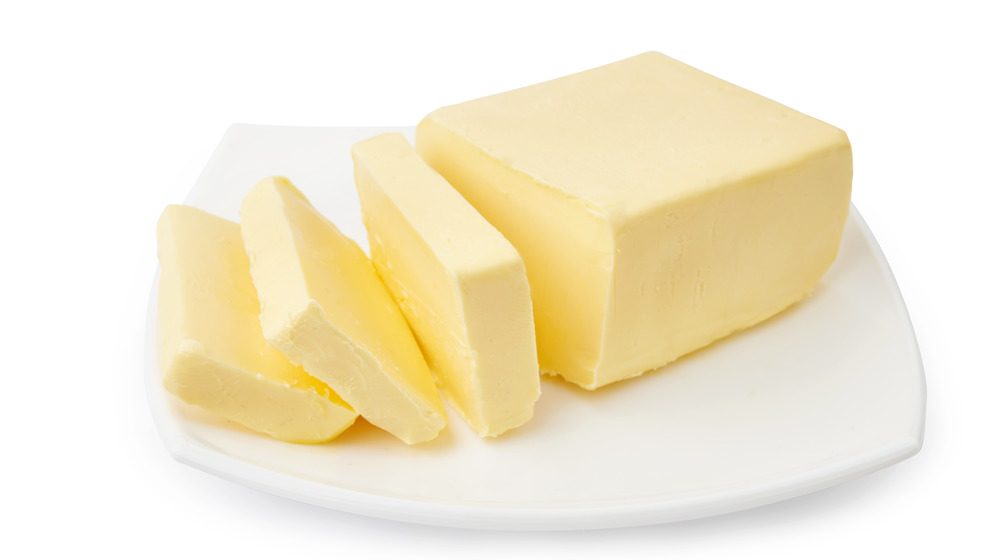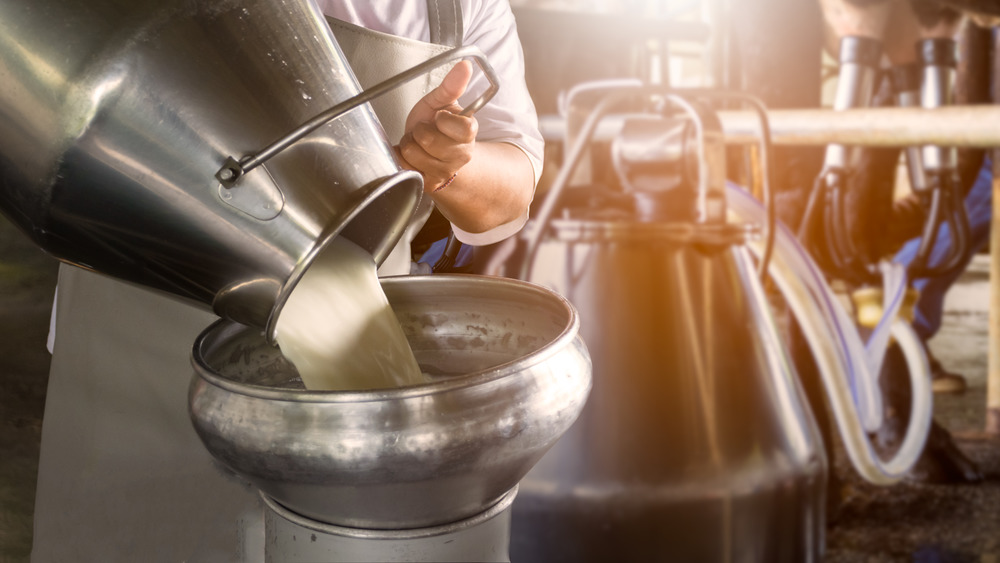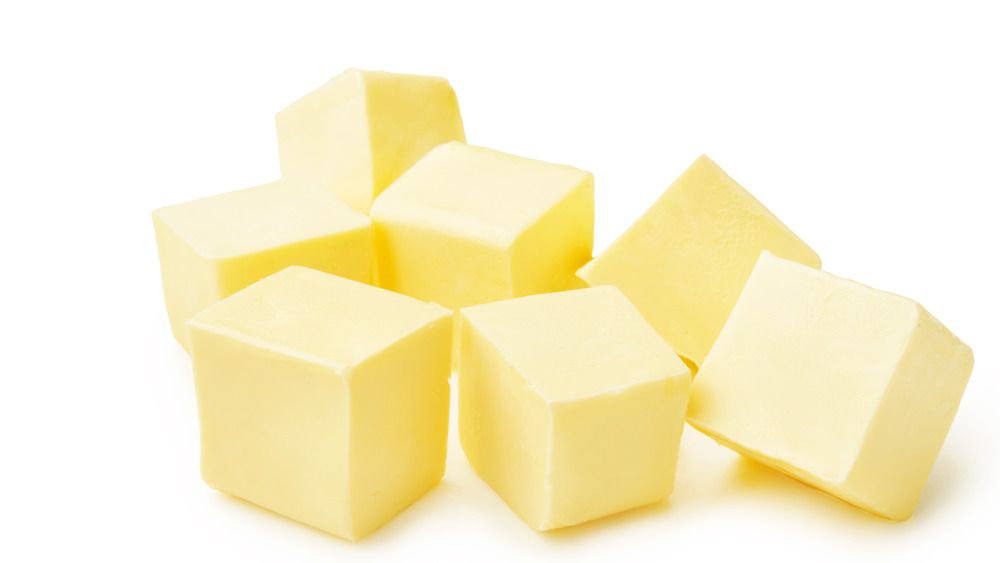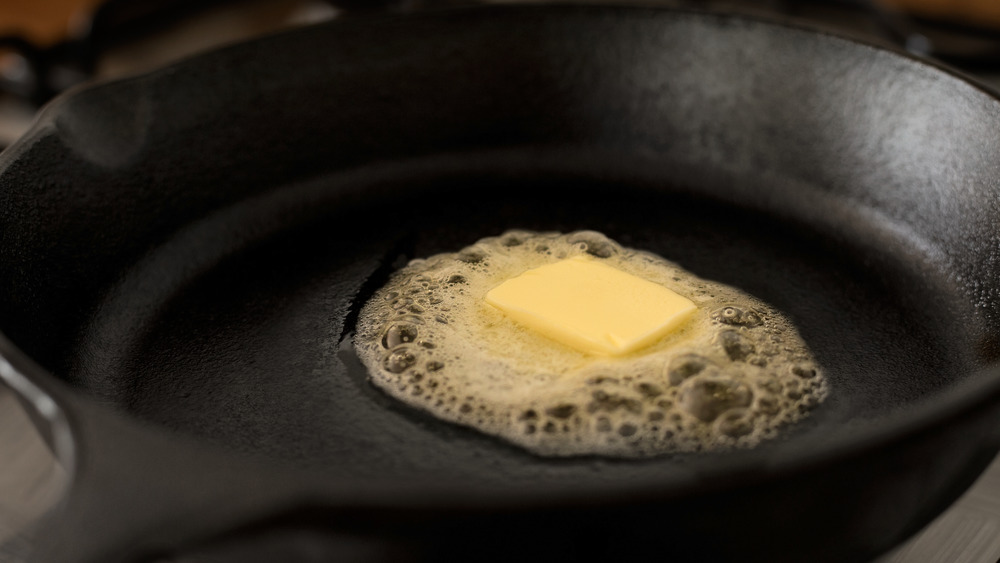The Confusing Change Canadians Have Been Noticing In Their Butter
Humans are generally creatures of habit, and there are certain truths about our favorite foods and ingredients that we hold dear. For instance, chili sauce should add heat. Salt makes things, well, salty. And heat-sensitive dairy products like ice cream or butter should soften at room temperature, except when they don't. And that's the problem Canadian consumers are facing today.
Trust social media to raise the alarm over the weird thing that's happening with Canadian butter. In early February, noted Canadian cookbook author Julie Van Rosendaal took to Twitter to ask followers if they had noticed something weird. "Something is up with our butter supply, and I'm going to get to the bottom of it. Have you noticed it's no longer soft at room temperature? Watery? Rubbery?" Van Rosendaal then proceeded to outline what she thought was causing the subtle, yet disturbing change: "my theories involve a) changes in policies and practices to Canada's tariff rate quota, and b) targeted changes in feeding + farming practices to modify the fatty acid profile of bovine milk in an attempt to boost yield/improve stability (saturated fatty acids=solid at room temp)."
Canadian dairy farmers are giving cows more palm oil-based feed: expert
Turns out, the pandemic has done more to affect Canada's dairy than its consumers might have expected because increased demand for butter also messed with the feed consumed by the country's dairy cows. Dairy farmers use a palm oil-based feed to supplement their cow's diets; and while this has been going on for more than a decade, food scientist Sylvain Charlebois of Dalhousie University believes farmers are now giving their cows more of that feed to bump up milk production. As a result, that feed is likely giving butter an extra ingredient no Canadians wanted: palmitic acid, a palm oil derivative, which may be giving butter a shield of invincibility it didn't have before (via NPR). The supplement is sold as an additive that increases both a cow's ability to produce milk and the amount of fat which can be found in the milk (via Chatelaine).
Having additional palmitic acid in the feed may not just be messing with butter, it could be changing Canada's milk, too. Charlebois points to a separate incident involving the British Columbia Milk Marketing Board as proof of changes at the dairy farm level; last October, the group came out to address a problem involving milk that could not foam, and at the time, the group couldn't say why this was the case and it pointed to lipolysis – a chemical process that sees fat cells breaking down – as the probable cause.
Canadians are consuming more butter
Chatelaine says that for years, palmitic acid was used to bump up the content of butterfat so products could meet Canada's standards. Van Rosendaal said, "The researchers I spoke with said higher doses, like over 300 grams per cow, per day, was where they started to see the connection in the palmitic acid transferred to the milk." Some feed companies are currently recommending a daily palmitic acid supplement of 400 to 900 grams per cow.
Van Rosendaal didn't appear to be too surprised by the turn of events because Canada's butter consumption is up – Dairy Farmers of Canada says sales rose 12.4 percent in 2020 – even as there was a large cull in the number of dairy cows. Canada's butter supply is also being squeezed by a limit to the amount of butter imported with low to zero taxes and as a result, "Farmers are needing to produce more butter to meet their quotas with fewer cows," she said. As Charlebois pointed out, palmitic acids may be pricey, "but they're cheaper than getting new cows in a barn for sure" (via NPR).
"Buttergate" has wide-reaching consequences
If you point out that palmitic acid comes from the same controversial palm oil which is used in many processed foods from baked goods to chips and breads, and which has also
been associated with many undesirable side effects, from environmental degradation to an increased risk of heart disease in us humans, you'd be correct. So it may make Canadians feel better to know that the Dairy Farmers of Canada industry group is now asking its members to look at using something other than palm oil as an additive to give its livestock. One dairy farmer has told CTV News that while his customers are his first priority, "I think the cows are the ones that will have to suffer in this, as palm oil is definitely a great energy source for them."
Charlebois argues that the problem is much wider than non-melting butter, and which he calls "buttergate," suggests. He says: "Whether or not the butter is healthy ... we just don't know. There's a complete disconnect between animal feed practices and how these food products impact the health of consumers" (via NPR).



